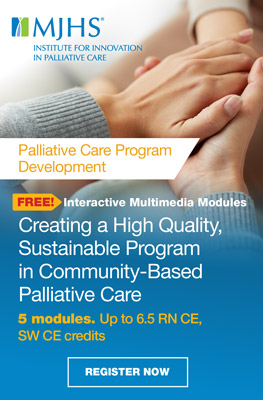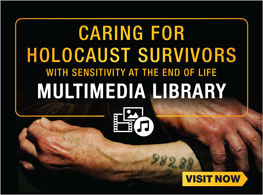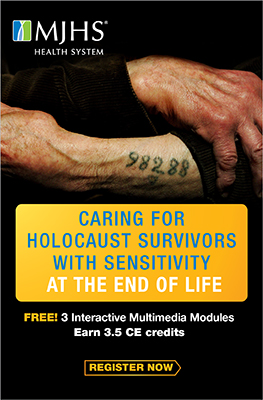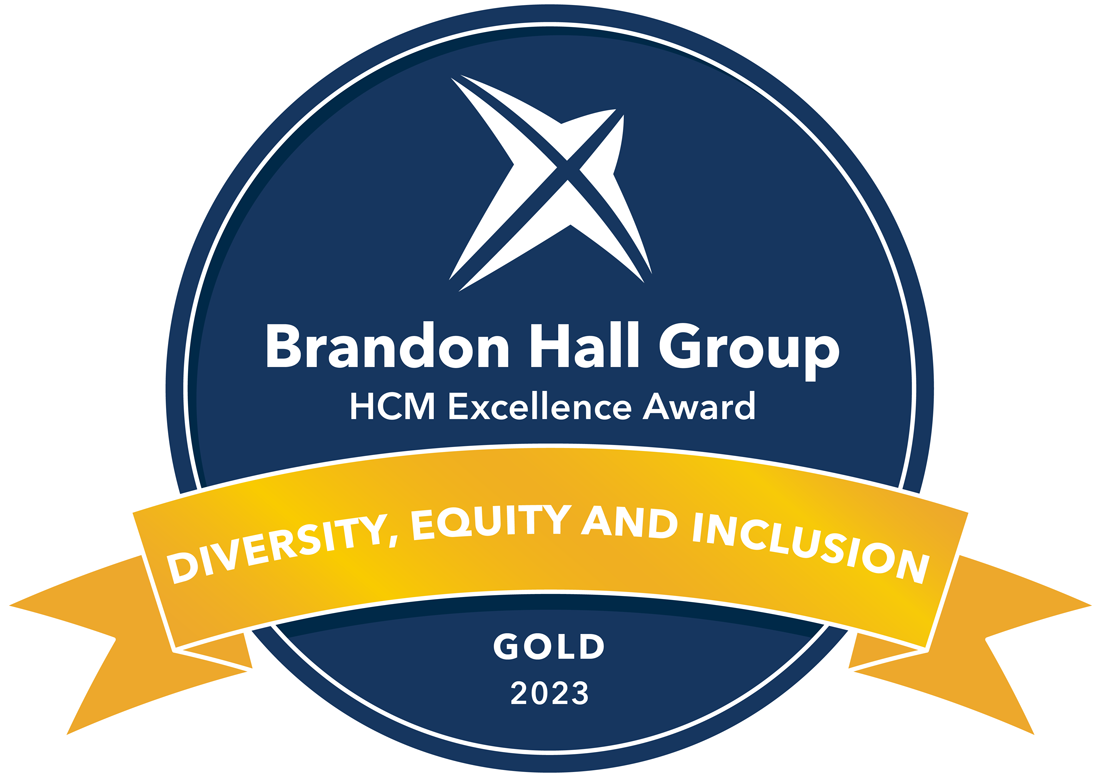Hospice & Palliative Care
ONLINE CONTINUING EDUCATION
Learn Anytime. Earn Credits. Improve Practice.
Palliative Care for Case Managers
21 FREE on-demand CCMC-approved webinars for case managers
Palliative Care for Case Managers 22.5 Credits
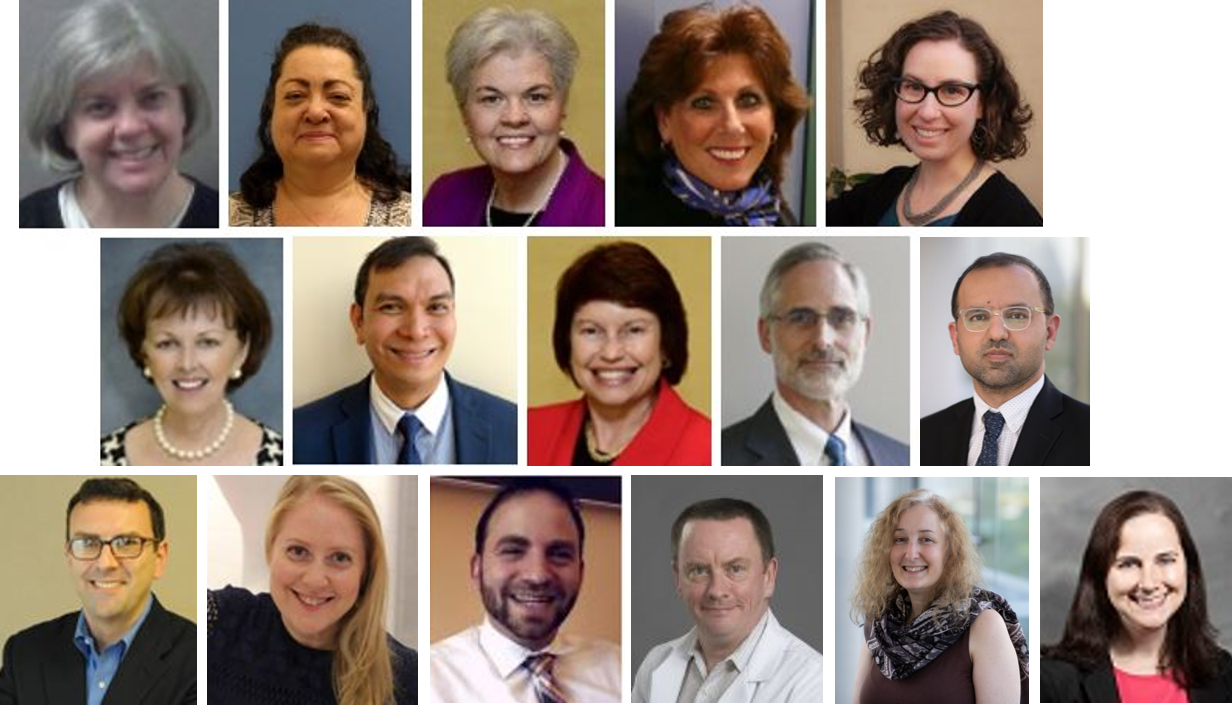
Adam Schoenfarber, LCSW, APHSW-C
Palliative Care Social Worker
Westchester Medical Center's Advanced Physician Services
Alison Moadel, PhD
Deputy Director, Community Engagement & Cancer Health Equity
Founding Director, BOLD Cancer Wellness Program
Montefiore Einstein Cancer Center, Bronx, NY
Ammar Y. Ahmad, MD
Attending Psychiatrist
Heart and Lung Transplant Programs
Montefiore Medical Center
Betty Hilleman, MBA, MSN, RN, CHPN
Palliative Care RN Specialist
MJHS Hospice and Palliative Care
Billy Rosa, PhD, MBE, APRN
Assistant Attending Behavioral Scientist
Department of Psychiatry and Behavioral Sciences
Memorial Sloan Kettering Cancer Center, New York
Charlotte Huebner, RN-BC, BSN, CHPN
Staff Development Educator
MJHS Hospice and Palliative Care
Colleen Fleming-Damon, PhD, ANP-BC, ACHPN, FT
Director of Education and Training
MJHS Institute for Innovation in Palliative Care
Joyce Palmieri, MS, RN, CHPN, FPCN
Senior Vice President of Clinical Services
MJHS Hospice and Palliative Care
Lisa Rosenzweig, PhD
Bereavement Coordinator
MJHS Hospice and Palliative Care
Mara Lugassy, MD
Palliative Medicine Section Chief
Westchester Medical Center
Assistant Clinical Professor
New York Medical College
Marilyn Bookbinder, RN, PhD, FPCN
Director of Quality and Performance Improvement
MJHS Institute for Innovation in Palliative Care
Assistant Professor
Department of Family and Social Medicine
Albert Einstein College of Medicine
Michael Mencias, MD, FAAHPM
Senior Hospice Physician
MJHS Hospice and Palliative Care
Myra Glajchen, DSW, MSW, BSW, ACSW, APHSW-C
Director of Education and Training
MJHS Institute for Innovation in Palliative Care
Russell K. Portenoy, MD
Chief Medical Officer, MJHS Hospice and Palliative Care
Executive Director, MJHS Institute for Innovation in Palliative Care
Professor of Neurology and Family and Social Medicine
Albert Einstein College of Medicine
Sean O’Mahony, MB BCh BAO, MS, FAAHPM
Section Director Palliative Medicine, Rush University Medical Center
Professor of Medicine, Rush Medical College
Professor Department Community, Systems and Mental Health Nursing, Rush College of Nursing
Co-Director, Coleman Palliative Medicine Training Program
Timothy W. Kirk, PhD, HEC-C
Ethics Consultant
MJHS Hospice & Palliative Care
Professor of Philosophy, City University of New York
Goal: Webinars within this series are designed to help case managers better understand the needs and care options of seriously ill patients from the time of diagnosis to the end of life, improving their abilities in communicating with patients, families, and providers.
A Key Outcome of Advance Care Planning: The Advance Directive
Purpose: Having an advance directive has been linked to cost savings (Medicare dollars) at end-of-life, a lower likelihood of dying in a hospital where most do not prefer, and higher usage of hospice care and better quality of dying for patients and their families. The goal of this seminar is to gain an introductory understanding of the social changes that have occurred since the enhancement of the Patient Self-Determination Act (PSDA) in 1991, specifically the advance directive. This webinar will provide an introduction to major efforts leading the field of palliative care to improve the quality of advance care planning discussions and the completion of advance directives.
Objectives:
- Discuss the prevalence and significance of having an advance care planning discussion and completion of an advance directive
- Recognize the barriers and facilitators to conducting advance care planning discussions and completing an advance directive
- Describe resources and strategies for improving advance care planning discussions and completing an advance directive for patients and families and professionals
- Review common situations in which nurses can identify barriers and facilitate discussions and completion of advance directives
Assessment and Management of Impending Death (2024)
Purpose: Acquire the knowledge and skills required of a specialist-level palliative care clinician in evaluating and managing a patient in impending death.
Objectives:
- Identify and manage the signs and symptoms associated with impending death, using nonpharmacologic and pharmacologic options
- Recognize and address the common family concerns preceding death
- Describe how to pronounce a patient’s death and provide postmortem care
Caregiving Professionally: Putting out Fires Everyday but at Risk for Burnout
Purpose: The purpose of the webinar is to increase clinicians’ awareness of 1) the risk for compassion fatigue, vicarious traumatization, and burnout when caring for palliative care and hospice patients and their families, particularly in the current context of the COVID-19 pandemic, and 2) self-care strategies used to mitigate the risks.
Objectives:
- Define and discuss the risks of caring for patients and families in a palliative care or hospice context
- Describe the elements of self-care and its significance when caring for those receiving palliative care or hospice services
- Consider professional caregiving risks and self-care in the context of the COVID-19 pandemic
- Create a personalized plan for self-care to promote wellness in the workplace and mitigate risks
Communication With Patients and Families at End-of-Life
Purpose: This webinar will review communication skills needed for the clinical practice of palliative care and end-of-life nursing care.
Objectives:
- Describe mindfulness processes that nurses can use in preparation for skillful clinical communication
- List three techniques that are used to structure skillful clinical communication
- Identify three benefits of using skilled communication techniques
Depression and Anxiety in the Seriously Ill
Purpose: This webinar is intended to promote a greater understanding of mental illness within patients suffering from a life-threatening or terminal illness. The presentation will help providers identify and evaluate both depression and anxiety and implement appropriate and effective treatment strategies.
Objectives:
- Define depression and anxiety and their presentation amid serious and debilitating illnesses
- Discuss the clinical evaluation and diagnoses of depression and anxiety
- Explain the various treatment modalities for depression and anxiety
Ethical Decision-Making When Advance Directives May No Longer Apply
Purpose: This webinar will discuss ethical decision-making in the context of directive documents which may no longer apply.
Objectives:
- Describe findings in the literature on stability of patient preferences over time and health status
- Identify ethical questions raised when the only advance directive documents available are either outdated or drafted under significantly different clinical circumstances
- Interrogate the value of advance directive documents for ethical decision-making in such case
Evidence-Based Advocacy for the Hospice and Palliative Care Clinician
Purpose: This webinar will review evidence-based advocacy approaches to support equitable hospice and palliative care access and delivery at local, national, and international levels. Empirical data and case studies will be used to describe the advocacy process and provide suggestions to achieve future advocacy goals. Content will be aimed at interdisciplinary clinicians with a primary aim to reconsider advocacy as a fundamental component of hospice and palliative care practice.
Objectives:
- Identify key elements of evidence-based advocacy in the hospice and palliative care context
- Apply serious illness communication skills to foster relationships with stakeholders and advance advocacy endeavors
- Discuss ways to use both personal identity and professional obligations to advocate effectively
- Explain how to combine data and narratives to support an advocacy agenda
Goodbyes and Condolences in Palliative and Hospice Care
Purpose: The purpose of the webinar is to 1) increase clinicians’ awareness of patients’ and loved ones’ needs for closure in the clinical relationship, and 2) provide guidance on how to meet these needs.
Objectives:
- Outline and discuss the closure needs of patients and their loved ones in palliative and hospice care
- Normalize clinicians’ challenges of engaging with closure activities
- Provide concrete guidance on supporting patients’ and loved ones’ closure needs prior to death
- Provide concrete guidance on expressing condolences to loved ones after a death
Hospice: Current Perspective
Purpose: This webinar will describe the evolution of hospice in the U.S. from its inception to its current form—a large, highly regulated government program providing home-based palliative care to patients with advanced illness and their families.
Objectives:
- Define hospice as it has evolved in the U.S. and understand its history
- Explain hospice’s relationship to palliative care and describe hospice in terms of its characteristics as a healthcare delivery system
- Identify emerging trends in hospice, continuing barriers to utilization, and the impact of the COVID-19 pandemic on hospice care
Interprofessional Team Conflict
Purpose: The aim of this webinar is to assist participants to increase their knowledge and understanding of interdisciplinary conflict in hospice and palliative care teams and to develop strategies for conflict resolution.
Objectives:
- Define team conflict
- Describe the purpose and goals of the interdisciplinary team (IDT) in hospice and palliative care
- Identify common sources of team conflict
- Describe strategies for resolving various types of conflict
LGBTQ-Inclusive Hospice and Palliative Care
Purpose: LGBTQ people experience disparate treatment in many different settings; this extends to healthcare. Although LGBTQ people have seen advances in legal protections in the last two decades, there has been a recent backlash with enactment of legislation that is hostile to LGBTQ people across the country. We will address the research evidence base on disparate experiences for LGBTQ people in the healthcare systems. We will address ways that individual clinicians can enhance the care of LGBTQ people and ways that healthcare systems can provide access to care that is inclusive towards LGBTQ people and their families of choice.
Objectives:
- Present results of a patient and family national survey on the experience of hospice and palliative care for LGBT people
- Explain sexual orientation and gender identity (SOGI) terminology to create an accepting environment
- Recognize the importance of providing care to LGBT patients and their loved ones at end of life
- Identify barriers to providing this care
- Implement best practices to create change
Nursing Assessment and Case Management
Purpose: This webinar will assist the participant to acquire the knowledge and skills to provide hospice and palliative care for individuals with chronic illness, leading to the improvement of quality of life for individuals with chronic illness.
Objectives:
- Explain the principles and models of case management
- Articulate and incorporate the practice of clinical assessment
- Articulate and incorporate best practices in the assessment and management of patients with chronic illness
Nursing Assessment and Management of Pain in Advanced Illness
Purpose: The purpose of this webinar is to acquire the knowledge and skills to incorporate best practices for the assessment and management of pain in individuals with advanced illness.
Objectives:
- Explain the principles and theories of pain
- Articulate and incorporate the practice of pain assessment
- Assess the presence of pain utilizing specific tools to scale and interpret
- Articulate and incorporate best practices in the pharmacological and nonpharmacological management of pain
Nursing Care in the Final Hours of Life
Purpose: The goal of this webinar is to: 1) Educate nurses in clinical skills and professional mindfulness necessary to provide a therapeutic presence for a patient and family as death nears and 2) Educate nurses in the role of the hospice nurse as a member of the interdisciplinary team.
Objectives:
- Assess the physical signs of disease progression indicative of approaching death, and name at least three common signs and symptoms
- Assess the psychosocial and spiritual-existential factors which impact a patient's and family's experience of approaching death, and state the potential impact on the dying process
- Facilitate physical, psychosocial, and spiritual comfort through nursing interventions during the final hours of life, and give an example which includes at least three holistic interventions
Nursing Symptom Assessment and Management in Hospice and Palliative Care
Purpose: The purpose of this webinar is to assist the participant to acquire knowledge and skills to provide hospice and palliative care nursing for individuals with chronic illness. This knowledge will help in the palliation of symptoms, leading to the improvement of quality of life for individuals with chronic illness.
Objectives:
- Assess and screen for dyspnea, anxiety, depression
- Articulate best practices for nursing assessment and management of these prevalent symptoms of chronic illness
- Integrate didactic learning into practice
Palliative Care in Coma and Disorders of Consciousness (2024)
Purpose: Disorders of consciousness, such as coma, vegetative state, and minimally conscious state present a unique challenge for the palliative care team, given the often sudden and unexpected onset, the uncertainties of prognosis, and the profound barriers to patient communication. The aim of this webinar is to provide the necessary knowledge base and skills to the interdisciplinary palliative care team to better support patients, families, and other caregivers who are facing these conditions.
Objectives:
- Differentiate between coma, vegetative state, and minimally conscious state
- Review prognostic indicators for patients in coma and other disorders of consciousness
- Identify strategies to address common family and caregiver questions and concerns, including communication and pain management
Palliative Care in Dementia (2024)
Purpose: The purpose of this webinar is to enhance knowledge of the management of common dementia subtypes throughout the course of disease.
Objectives:
- Differentiate disease trajectories and management strategies for common dementia subtypes
- Develop a framework for management of common behavioral concerns in dementia
- Identify strategies to integrate hospice care into the management of late-stage dementia
Psychosocial Needs of Cancer Patients From an Ethnically Diverse Underserved Community
Purpose: The needs to grow, connect, and contribute can be seen across ethnicities, socioeconomic levels, and the lifespan, including at the end of life. Palliative care providers can benefit from understanding these psychosocial needs and how salient they are among underserved and ethnic minority patients with advanced disease. Towards this end, this webinar will describe data of an ongoing psychosocial needs assessment of cancer patients from the disadvantaged and ethnically diverse community of Bronx, NY. It will also present a brief overview of the BOLD Cancer Wellness Program developed in response to this needs assessment.
Objectives:
- Describe salient psychological and social needs among advanced stage, underserved cancer patients
- Review assessment tools for identifying psychosocial needs and interests
- Discuss strategies to support patients’ needs for growth, connection, and contribution at end of life
Serious Illness Discussions (2024)
Purpose: Patients with serious chronic illnesses benefit from repeated, timely, sensitive, and actionable goal setting discussions. The goal of this webinar is to describe the elements of goal setting discussions and provide a framework for improving the ability of clinicians to engage in these discussions with seriously ill patients and their families.
Objectives:
- Position goals discussions as part of palliative care
- Develop a workable definition and framework for goals discussions
- Discuss a communication tool for goal setting discussions
The Family Meeting in Palliative Care: Best Practices
Purpose: The purpose of this webinar is to describe the importance of the family meeting as a best practice for advance care planning and caregiver support in hospice and palliative care.
Objectives:
- Discuss best practices related to the family meeting in hospice and palliative care
- Describe core communication skills integral to the family meeting
- Discuss challenging clinical scenarios in the context of the family meeting
Understanding and Improving Hospice Underutilization
Purpose: In this webinar, attendees will gain knowledge about the value proposition and underutilization of the Hospice benefit, patient eligibility and enrollment practices, and the manifold barriers to access, and will acquire information about changes in practice that may improve hospice utilization.
Objectives:
- Discuss the elements that comprise the Hospice benefit in the U.S.
- Explain the regulatory requirements for Hospice eligibility
- Discuss the array of factors that may limit access to hospice use
- Present strategies for improving Hospice utilization at the practice level
- Describe the types of next steps that would be needed to improve access to hospice throughout the healthcare system
Target Audience: Case managers
Criteria for Successful Completion:
- Attendance at entire session
- Submission of completed evaluation form
- Successful completion of a posttest; 70% passing grade
Continuing Education Credits: 22.5
Continuing Education Accreditation
Case Managers: This program has been pre-approved by the Commission for Case Manager Certification to provide continuing education credit to CCM® board-certified case managers.
Fees: Free (includes CE certificate)
Release Date: November 18, 2025
Expiration Date: November 18, 2026
Disclosures:
Adam Schoenfarber, LCSW, APHSW-C; Alison Moadel, PhD; Ammar Y. Ahmad, MD; Betty Hilleman, MBA, MSN, RN, CHPN; Billy Rosa, PhD, MBE, APRN; Charlotte Huebner, RN-BC, BSN, CHPN; Colleen Fleming-Damon, PhD, ANP-BC, ACHPN, FT; Joyce Palmieri, MS, RN, CHPN, FPCN; Lisa Rosenzweig, PhD; Mara Lugassy, MD; Marilyn Bookbinder, RN, PhD, FPCN; Michael Mencias, MD, FAAHPM; Myra Glajchen, DSW, MSW, BSW, ACSW, APHSW-C; Russell Portenoy, MD; Sean O’Mahony, MB BCh BAO, MS, FAAHPM and Timothy W. Kirk, PhD, HEC-C have no financial disclosures.
No other Planning Committee Member has financial disclosures.
Planning Committee Members
Myra Glajchen, DSW
Kerrianne P. Page, MD, HMDC
Joyce Palmieri, MS, RN, CHPN
Karen Richards, PhD, EdS
The MJHS Institute for Innovation in Palliative Care is pleased to offer free interdisciplinary palliative care webinars, live and on demand, delivered by frontline experts, typically offering Continuing Medical Education (CME), Nursing continuing education (CE), Social Work CE credits, Case Manager CCMC CE credits, and Music Therapy CE credits.
Our free interactive multimedia modules on Community-Based Palliative Care Program Development and Caring for Holocaust Survivors With Sensitivity at End of Life offer up to 9.75 CE credits.
Free pdf downloads now available: 15 palliative care professional factsheets and patient education handouts on 18 topics in English, Spanish, Haitian Creole, Arabic, French, and Russian.
